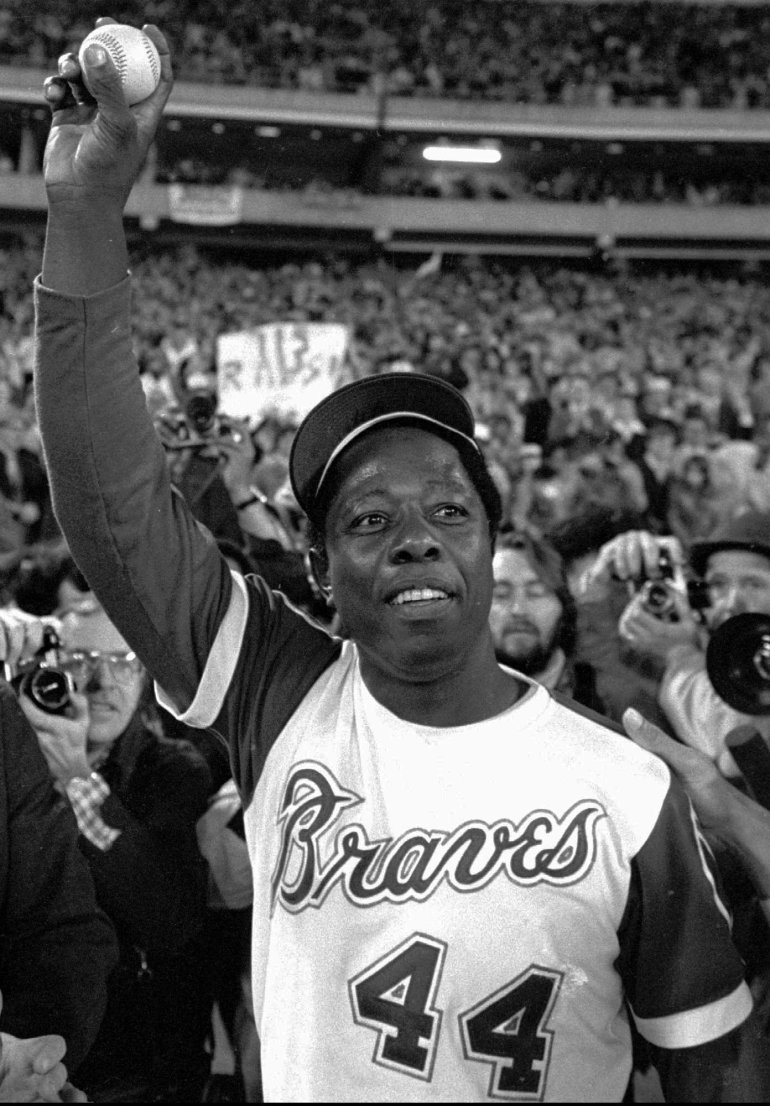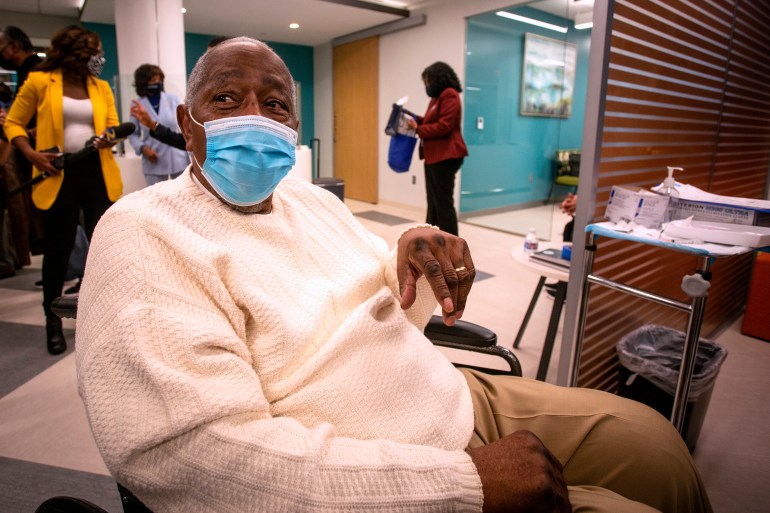US baseball legend and civil rights icon Hank Aaron dies
Aaron, one of the few Black baseball players at the time, beat Babe Ruth’s home run record in 1974.
![Former Atlanta Braves's Hank Aaron is honoured during a ceremony before a baseball game between the Braves and the San Diego Padres in Atlanta [File: John Bazemore/AP Photo]](https://www.aljazeera.com/wp-content/uploads/2021/01/AP_17105082635169.jpg?resize=770%2C513)
Hank Aaron, who endured racist threats with stoic dignity during his pursuit of Babe Ruth’s home run record and gracefully left his mark as one of baseball’s greatest all-around players, has died. He was 86.
The Atlanta Braves, Aaron’s longtime team, said he died peacefully in his sleep on Friday. No cause was given.
Aaron’s hitting prowess earned him the nickname “Hammerin’ Hank”, and his power was attributed to strong wrists. He was somewhat shy and unassuming and did not have the flair of contemporaries Willie Mays and Mickey Mantle.
Aaron was in the news two weeks ago when he publicly received the first dose of Moderna’s COVID-19 vaccine with his wife, Billye, with the aim of sending a message to Black Americans that the shots are safe.
Getting vaccinated “makes me feel wonderful”, Aaron said at the time. “I don’t have any qualms about it at all, you know. I feel quite proud of myself for doing something like this … It’s just a small thing that can help zillions of people in this country.”
 Aaron played with a smooth, under-control style that made the game look so easy that some critics wondered if he was really giving his best [File: AP Photo]
Aaron played with a smooth, under-control style that made the game look so easy that some critics wondered if he was really giving his best [File: AP Photo]The longtime Milwaukee/Atlanta Braves slugger held the record for most career home runs for more than 30 years before Barry Bonds broke it in 2007. Aaron finished his 23-year career with 755 home runs, including an 18-year stretch where he hit at least 24 every season.
Aaron began his career in the Negro Leagues in 1951 with the Indianapolis Clowns, before the Braves picked up his contract. He made his MLB debut in 1954 and spent the next 21 seasons with the Braves before ending his career with the Milwaukee Brewers (1975-1976).
He appeared in a record-breaking 25 All-Star games.
Aaron was elected to the Hall of Fame on his first ballot in 1982. Both the Braves and Brewers retired his Number 44.
But Aaron’s journey to that memorable homer was hardly pleasant. He was the target of extensive hate mail as he closed in on Ruth’s cherished record of 714, much of it sparked by the fact that Ruth was white and Aaron was Black.
“If I was white, all America would be proud of me,” Aaron said almost a year before he passed Ruth. “But I am Black.”

Another Black baseball player, Jackie Robinson, who was Aaron’s hero, had integrated the major leagues in 1947. Still, when Aaron arrived in 1954, the US civil rights movement had yet to build momentum. Aaron sometimes found himself unable to stay in the same hotels or eat in the same restaurants as his white teammates, some of whom ostracised him.
The drive for the home run title left scars on Aaron. In his 1991 autobiography, I Had A Hammer, he described the final days of his quest by saying: “I thought I had earned the right to be treated like a human being in the city that was supposed to be too busy to hate.“The way I saw it, the only thing Atlanta was too busy for was baseball. It didn’t seem to give a damn about the Braves, and it seemed like the only thing that mattered about the home run record was that a nigger was about to step out of line and break it.”
Aaron played with a smooth, under-control style that made the game look so easy that some critics wondered if he was really giving his best. But Aaron was driven by a powerful inner desire as he overcame an impoverished youth and racial hatred to become one of the greatest and most consistent baseball stars of all time.
Aaron’s profile on the Baseball Hall of Fame’s website notes that boxing legend Muhammad Ali called Aaron “the only man I idolise more than myself”. It quotes Mickey Mantle as calling Aaron “the best baseball player of my era … He’s never received the credit he’s due”.

No comments:
Post a Comment